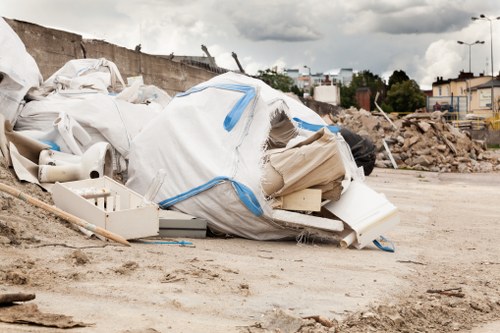Rubbish Removal in White Goods Recycle

Proper rubbish removal plays a crucial role in sustainable living, especially when it comes to recycling white goods. White goods, such as refrigerators, washing machines, and dryers, are household appliances that have a significant environmental impact if not disposed of correctly. This article delves into the importance of rubbish removal in white goods recycling, the processes involved, and the benefits it brings to both the environment and consumers.
White goods typically contain various materials, including metals, plastics, and electronic components, which can be recycled and repurposed. Effective rubbish removal ensures that these materials are processed correctly, reducing the need for raw materials and minimizing landfill waste. Understanding the intricacies of white goods recycling can help individuals and businesses make informed decisions about appliance disposal.
Moreover, improper disposal of white goods can lead to environmental hazards. Appliances may leak harmful substances like refrigerants and oils, which can contaminate soil and water sources. Therefore, engaging in responsible rubbish removal practices is essential for safeguarding our environment and promoting a circular economy.

Understanding White Goods Recycling
Recycling white goods involves several steps, from collection to processing. Each stage requires specific handling to ensure maximum material recovery and minimal environmental impact. Here's a breakdown of the white goods recycling process:
- Collection: Appliances are collected from households, businesses, or donation centers. Proper scheduling and transportation are vital to maintain the efficiency of the recycling process.
- Sorting: Upon arrival at the recycling facility, white goods are sorted based on type, size, and condition. This step helps in determining the appropriate recycling methods for each appliance.
- Disassembly: Appliances are carefully disassembled to separate recyclable materials like metals and plastics from non-recyclable components.
- Processing: Separated materials undergo processes such as shredding, melting, and reforming to prepare them for reuse in manufacturing new products.
- Disposal: Any hazardous or non-recyclable materials are disposed of according to environmental regulations to prevent contamination.

The Importance of Professional Rubbish Removal Services
While some individuals may opt for DIY disposal methods, professional rubbish removal services offer numerous advantages. These services ensure that white goods are handled responsibly, adhering to safety and environmental standards. Here are some reasons to consider professional rubbish removal:
- Expertise: Professionals are trained to handle various types of appliances, ensuring that hazardous materials are managed correctly.
- Convenience: Hiring a service eliminates the hassle of transporting bulky appliances, saving time and effort.
- Compliance: Reputable companies comply with local regulations and recycling guidelines, avoiding potential legal issues.
- Environmental Impact: Professional services maximize material recovery, contributing to sustainability and resource conservation.

Benefits of Recycling White Goods
Environmental Benefits
Recycling white goods offers substantial environmental advantages. It reduces the demand for new raw materials, conserves energy, and lowers greenhouse gas emissions. By reusing metals and plastics, recycling minimizes the extraction and processing activities that are often detrimental to ecosystems.
Economic Benefits
Recycling also has positive economic implications. It creates jobs in the recycling and manufacturing sectors and generates revenue from the sale of recovered materials. Additionally, consumers can benefit from discounts or incentives offered by retailers who participate in recycling programs.
Social Benefits
Promoting white goods recycling fosters a culture of responsibility and sustainability within communities. It encourages individuals to think about their consumption patterns and the lifecycle of the products they use. Educational initiatives and awareness campaigns can further enhance participation rates and societal commitment to environmental stewardship.

Choosing the Right Rubbish Removal Service
Selecting a reliable rubbish removal service is crucial for effective white goods recycling. Here are some factors to consider when making your choice:
- Certification and Licensing: Ensure the company is certified and complies with local recycling laws and regulations.
- Reputation: Look for reviews and testimonials to gauge the quality of service and customer satisfaction.
- Services Offered: Choose a service that provides comprehensive recycling options, including pick-up, transportation, and processing.
- Pricing: Compare prices to find a service that offers fair rates without compromising on quality.
- Sustainability Practices: Opt for companies committed to environmentally friendly practices and transparency in their recycling processes.
Contact us today to ensure your white goods are recycled responsibly and contribute to a greener planet.
Frequently Asked Questions
- Effective White Goods Recycling in Wennington
- Essential Guide to Recycling White Appliances in Abbey Wood
- Sustainable White Goods Recycling Solutions in Finsbury
- Comprehensive Guide to White Goods Recycling in Slade Green
- Effective White Goods Recycling in Harlington
- Eco-Friendly White Goods Recycling Solutions in Wimbledon
- Sustainable Appliance Recycling in Eltham
- Sustainable White Goods Recycling with Fortis Green
- White Goods Recycling in Woodside Park: Your Complete Guide
- Sustainable Appliance Recycling in New Cross
- Efficient White Goods Recycling Solutions in Charlton
- Sustainable White Goods Recycling in Little Ilford
- Sustainable Appliance Recycling in West Green
- Efficient White Goods Recycling Services in Farringdon
- Sustainable Appliance Disposal in Snaresbrook
- Essential Guide to Recycling White Goods in Westminster
- Comprehensive Guide to Recycling White Goods in Hook